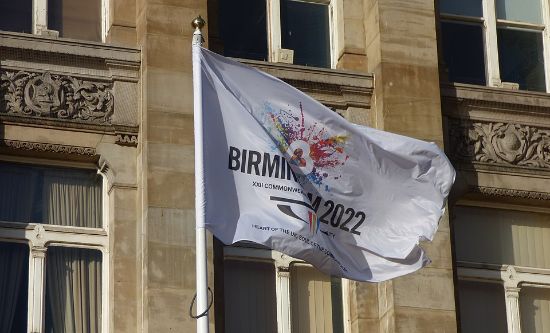As the Commonwealth Games held in Birmingham from 28 July to 8 August come to an end, it is time to look behind the media spin given to the event, promoting it as a celebration of inclusivity and diversity that somehow ‘puts Birmingham on the map’, and expose the grim reality of racism and division that lies behind it.
In the first place, the Games themselves are a celebration of British imperialism and its global exports of inequality, racism and war. They are an attempt to sanitise the legacy of the British empire, writing out of history the brutal expropriation of Indian farmers, the colonial exploitation of the countries of the Caribbean, the continued plunder of Britain’s former colonies. The racism that is the direct corollary of that imperialist division of the world is alive and kicking in Birmingham today and has in fact been intensified by the whole process of the Birmingham Games – whose organisers’ agenda is, after all, not one of sport but of profiteering out of sport.
‘Common’ wealth?
By spending millions on using the Games to attract business to the city, while at the same time cutting services, Birmingham City Council has in practice deepened systemic racism and inequality within Birmingham. Black and minority ethnicities, and BAME women more so, are disproportionately harmed by ruthless austerity. The Barrow Cadbury Trust, in their paper Mapping of Race and Poverty in Birmingham, has data which shows that areas like Sparkbrook, Handsworth and Perry Barr have been impacted by generations of racist immigration and employment policies. Since the 1950s, people have been shipped in from the Commonwealth specifically to fill in gaps in low-paid work. Now the services on which they depend, such as council-run nurseries, libraries and healthcare, have all seen their funding slashed in the lead-up to the 2022 Games. Perry Barr is the 13th worst constituency out of 650 in the shameful rankings for child poverty rates in the UK. Birmingham City Council’s budget of £788m, including £594m from central government, has certainly not ‘trickled down’ to the city’s working class communities. Instead, an almost identical amount has been made in cuts over the last ten years – £642m between 2011 and 2021 with a further £123m projected for the coming year.
At the same time, the promises of ‘inclusion’ ring hollow when you see that, despite being one of the most racially diverse cities in Britain, just one out of 20 of the Commonwealth Organising Committee was not white. Back in July 2021, a joint letter from 51 prominent community figures from Birmingham expressed concern at this, only for its letter to be met with obfuscation from the organising committee. Birmingham’s Race Impact Group report card returned ‘amber’ or ‘red’ scores in a range of areas including Reporting, Race Actions, adhering to the Equalities Act 2010, Community Engagement and Legacy. Concerns were also raised by a range of liberal community organisations including the Equal Group, Birmingham Pride, Aston Performing Arts Academy, and BRAP.
Small wonder that the Race Impact Group found in March this year, in its assessment of the Games, that behind the banners and tokenistic reggae-pop anthems, residents of the predominantly Asian, Black and working class district of Perry Barr felt ignored and excluded from the Games. As with the 2012 Olympic Games, the driving force behind new buildings and developments are not sports and community, but capital accumulation through real estate and the rising cost of land.
The real legacy: homelessness, racism and pollution
Birmingham has 20,000 people on the waiting list for social housing in Birmingham. Yet despite this desperate need, promises of ‘affordable housing’ units as a legacy of the games were soon scrapped. As with the Olympic Games of 2012 in the east London boroughs of Tower Hamlets and Newham, and the Glasgow Commonwealth Games of 2014, the huge profits to be made from ‘luxury’ private housing trumped the promises made and the desperate needs of local working class communities. The city was told to brace for ‘very low’ social housing numbers in 2018; recent reports mention only ‘affordable’ housing, itself jargon to disguise unaffordability; even this was to make up less than a third of all housing to be completed. From 2011 to 2020, ‘affordable’ dwellings, let alone those available at social rent, were already being completed at less than half the rate set out by the City Council, dropping to a third for some years, with developers provided with options, under the ‘viability’ loophole, to abandon any commitment to affordable and social rent provision if it interferes with their sacred right to make exorbitant profits.
Even before the Games started, football grounds promised as local facilities were closed to make way for more unaffordable houses, leaving more than 50 teams without a base before the new season. Window-dressing and banners in the City Centre can’t hide this trend; in recent years the Drum, local university, swimming baths and wellbeing centres in Perry Barr have been sold off along with over 150 other public places in Birmingham, including community centres and boxing gyms.
The water company Severn Trent is a sponsor of the Games: its gift to Birmingham’s working class has been the discharge of raw sewage into waterways, including Sutton Park where Games events were to beheld. While they, and other sponsors like Coca-Cola as well as real estate developers profit from the Commonwealth jamboree, homeless families in temporary accommodation were unceremoniously shifted to Coventry to make way for tourists.
Meanwhile elderly Jamaican and Indian Commonwealth citizens Lewin Williams, Gurmit Kaur and countless others face deportation. So much for celebrating Birmingham’s ‘diversity and multiculturalism’. 60 years after Jamaica’s political independence and 75 years since the partition of India, this is the true imperial beat of the Commonwealth that lurks beneath its tokenistic reggae soundtrack.




